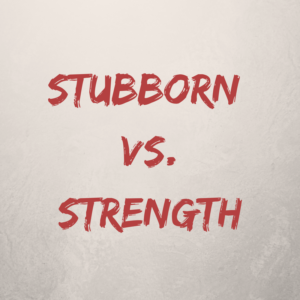 “I do not think much of a man who is not wiser today than he was yesterday.”― Abraham Lincoln
“I do not think much of a man who is not wiser today than he was yesterday.”― Abraham Lincoln
In our culture, when discussing leadership strength, you will hear words like; decisive, bold, unwavering, strong, courageous, tough, stable, stalwart, firm, backbone, firmness, power, might, fortitude, steady, etc. A leader is often defined as one who is strong, and unwavering. We can trust them to do what they say they will do and to take us up the proverbial mountain. For the most part, people will agree this is good and positive.
On the other hand, stubbornness is not viewed as positively, except in certain circumstances. Words like: inflexible, bullheaded, pigheaded, obstinate, doggedness and mulish are often used interchangeably with stubbornness. The problem is that strength and stubbornness are often confused or collapsed together.
I worked with a CEO once who was more in the stubborn category and he was roundly disliked by his staff and board alike. He got results, but at the expense of employee morale and often created more problems then he solved due to his intransigence. He believed that being open to other points-of-view was weak. What he eventually learned was that someone who was strong enough in their own knowledge and point-of-view could still be open to others. The former view was stubborn, the subsequent view was strength.
How Do You Discern the Difference?
- Being willing to question whether you are right. Being open to this is strong. Being closed to this is stubborn.
- Are you holding onto “your way” or are you open to the best way that all members of the team feel you need to go? If no one agrees with you, it’s probably stubbornness. If you have consensus, real consensus, not just driven by your title, it’s probably strength.
- What is your motive? If it’s for the good of the team, mission or purpose, it’s likely leadership strength. If it’s for personal gain, it might be stubbornness on your part.
- Are you willing to look at new information? Changing one’s mind due to new facts, (not alternative facts), is actually strong. Refusing to look at the new information is stubborn.
- Is ego involved? If so, it might be stubbornness. If it’s authentically for the greater good, it’s probably strength.
Think of this in terms of toddlers. When they don’t get their way, they throw a fit (and sometimes throw things) because they want what they want. Despite all the good reasons we give them for why it should be a different way they are often stubborn because the only person they are focused on pleasing is themselves.
On the other hand, good leaders will consider everyone and everything: employees, constituents, family, organizations, etc. When the greater good is at stake, strength will lead to solutions that benefit all or most of those impacted – at least that will be the intent. Stubbornness will lead to acrimony, “us vs. them,” and no one being pleased with the outcome except the leader.
